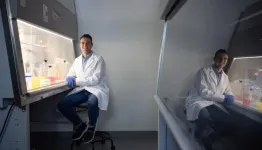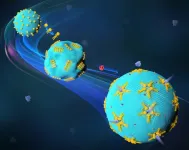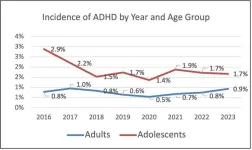(Press-News.org) SAN ANTONIO, Jan. 13, 2025 – With cancer still rising in the U.S. Latino population, leaders at The University of Texas Health Science Center at San Antonio (UT Health San Antonio) and national cancer experts have published an online book with innovative recommendations to reduce Latino cancer.
The book, “Advancing the Science of Cancer in Latinos: 2024 Conference Proceedings,” highlights results of the same-named conference that brought 300 researchers, advocates and survivors to San Antonio in February 2024.
A follow-up conference is planned for Feb. 18-20, 2026, in San Antonio.
Included in the book are promising research findings on Latino cancer and strategies for new research covering the entire cancer continuum, from advances in risk assessment, prevention, screening, detection, diagnosis, treatment, survivorship and policy.
“Our book, Advancing the Science of Cancer in Latinos: 2024 Conference Proceedings, takes an in-depth look at the state of cancer in Latinos and identifies collaborative solutions,” said Amelie Ramirez, DrPH, MPH, co-editor of the book. She is leader of the Salud America! program, professor and chair of Population Health Sciences, and director of the Institute for Health Promotion Research (IHPR) at UT Health San Antonio. IHPR co-hosted the 2024 conference along with the university’s Mays Cancer Center, home to UT Health San Antonio MD Anderson Cancer Center.
“The book and our biennial conference series make a unified call to action to address cancer issues that impact Latinos and all people,” she said.
Cancer is the top cause of Latino death
Latinos are the largest, youngest minority in the U.S., at 19.5% of the population. This makes it important to address the projected 142% rise in Latino cancer cases in coming years.
Cancer is the leading cause of death in the U.S. Latino population and, every year, about 144,154 Latinos are diagnosed with cancer, according to the new book.
Latinos face a heavy cancer burden due to barriers to care, low screening rates, low participation in clinical studies and data that fails to reflect the diversity within the U.S. Latino population.
“Our conference and book aim to share areas where different sectors of society can help address the burden of cancer among Latinos and all people,” Ramirez said.
Recommendations to address Latino cancer
The book unpacks recommendations for action in these areas:
Address systemic inequities behind cancer disparities.
Increase access to prompt cancer care.
Adapt successful interventions linguistically and culturally for a Latino audience.
Acknowledge language concordance between clinician and patient as vital to the Latino cancer experience.
Address toxicity among Latino pediatric cancer patients should be reduced when possible.
Use technology for patient education and engagement.
Reduce food insecurity through food programs.
Give extra help for young Latina mothers diagnosed with cancer.
Enhance cancer screening.
Expand access to genetic counseling and testing.
Prioritize the use of cancer prevention and screening programs.
Improve Latino cancer research methodology.
Conduct community engagement to build trust for sustainable relationships.
Build standardized research measurements and questions to ensure Latinos are not underrepresented in cancer research.
Generate appropriate data to facilitate discovery science.
Use electronic health records (EHRs) to support clinical trials.
Address clinical trial workforce issues.
Increase Latino clinical trial participation.
Tailor approaches to improve enrollment to specific settings and address structural barriers to Latino participation.
Emphasize provider-level training focused on patient-provider communication.
Emphasize patient-level factors, such as building trust, awareness of clinical trials, culture, language and health literacy-focused interventions, and initiatives to address socio-economic barriers.
Improve the Latino cancer survivorship experience.
Conduct more research in the area of Latino cancer survivorship.
Create effective patient-provider communication, which is central to timely, targeted integration of palliative care.
Consider the needs of Latino adolescent and young adult (AYA) cancer survivors.
Utilize exercise programs, which can be effective for survivors.
Consider self-acupressure as a useful tool in symptom management.
The book also shares a variety of model programs and resources that can shape future efforts to address cancer among Latinos and all people. It sets an agenda for future initiatives to address Latino cancer health disparities on all levels.
“We hope that readers will explore this important research to gain a fresh, comprehensive perspective on Latino cancer health disparities,” Ramirez said. She said she appreciates the opportunity to continue addressing cancer with her partners behind the Advancing the Science of Cancer in Latinos biennial conference.
“We anticipate this will inspire critical thinking and strategizing about how people can apply some of this research and practice into their own work at their own institution, leading to more collaboration, more research and success in improving the health and lives of U.S. Latinos,” she said.
Read the Book!
The 2024 conference sponsors included: platinum supporters Amgen, AstraZeneca, Bristol Myers Squibb, Genentech, and Gilead; silver supporters GMaP Region 3, Loxo@Lilly, National Cancer Institute, Pfizer, and Regeneron; and cancer center supporters Arizona Comprehensive Cancer Center, Sylvester Comprehensive Cancer Center, UCSD Moores Cancer Center in partnership with UCSD Center for Health Equity Education, and VCU Massey Comprehensive Cancer Center.
The 2024 conference scientific planning committee members included: Chair, Amelie G. Ramirez, DrPH, UT Health San Antonio; Co-chair, Edward J. Trapido, ScD, FACE, Louisiana State University; Barbara Segarra-Vázquez, DHSc, MT, University of Puerto Rico; Alejandro Recio Boiles, MD, FACP, University of Arizona; Maria Constanza Camargo, National Cancer Institute; Filipa C. Lynce, MD, Harvard University; Gerardo Colon-Otero, MD, Mayo Clinic, Florida; Katherine Y. Tossas, PhD, Virginia Commonwealth University; Laura Fejerman, PhD, MSc, University of California, San Francisco; Mariana C. Stern, PhD, University of Southern California; Martin Mendoza, PhD, Centers for Medicare and Medicaid Services and Office of Minority Health; Matthew P. Banegas, PhD, MPH, University of California, San Diego; Patricia I. Moreno, PhD, Miami University; and Sandi Stanford, Alamo Breast Cancer Foundation.
You can cite the new book here: Ramirez AG, Trapido EJ, editors. Advancing the Science of Cancer in Latinos: 2024 Conference Proceedings. 2024 Advancing the Science of Cancer in Latinos Conference, San Antonio, TX. Published online at https://www.salud-america.org/2024proceedings
The University of Texas Health Science Center at San Antonio (UT Health San Antonio) is one of the country’s leading health science universities and is designated as a Hispanic-Serving Institution by the U.S. Department of Education. With missions of teaching, research, patient care and community engagement, its schools of medicine, nursing, dentistry, health professions, graduate biomedical sciences and public health have graduated more than 43,886 alumni who are leading change, advancing their fields and renewing hope for patients and their families throughout South Texas and the world. To learn about the many ways “We make lives better®,” visit UTHealthSA.org.
Stay connected with The University of Texas Health Science Center at San Antonio on Facebook, Twitter, LinkedIn, Instagram and YouTube.
The Institute for Health Promotion Research (IHPR) investigates the causes of and solutions to the unequal impact of cancer, chronic disease and obesity among Latinos in San Antonio, South Texas and the nation. The IHPR, founded in 2006, is based at The University of Texas Health Science Center at San Antonio.
The Mays Cancer Center, home to UT Health San Antonio MD Anderson Cancer Center, is one of only four National Cancer Institute-designated Cancer Centers in Texas. The Mays Cancer Center provides leading-edge cancer care, propels innovative cancer research and educates the next generation of leaders to end cancer in South Texas. To learn more, visit www.UTHealthSAMDAnderson.org.
Stay connected with the Mays Cancer Center on Facebook, Twitter, LinkedIn, Instagram and YouTube.
END
New book provides big recommendations from the Advancing the Science of Cancer in Latinos Conference
Research findings, strategies target the leading cause of Latino death
2025-01-13
ELSE PRESS RELEASES FROM THIS DATE:
Ash tree variability may offer restoration path post-beetle decimation
2025-01-13
UNIVERSITY PARK, Pa. — The invasive emerald ash borer, according to the U.S. Department of Agriculture, was first found in the United States in southeast Michigan in 2002. In the decades since, the wood-boring beetle has spread east and west across the U.S. and Canada, killing tens of millions of ash trees, causing one of the costliest forest insect invasions to date. More than 90% of all ash infested by the insect native to Asia eventually die, threatening to make the tree species functionally extinct in North America. In response, researchers at Penn State are working with the U.S. Forest Service and other partners to identify and develop ...
Integrating CRISPR and biomaterials engineering: Paving the way for safer gene therapies
2025-01-13
CRISPR is a powerful gene-editing tool that holds enormous potential for treating genetic diseases by allowing scientists to cut, replace, or delete mutations in DNA. It can also modify gene expression, temporarily amplifying or diminishing its effects.
Yet, despite its promise, applying CRISPR (which is a reagent, or a substance that facilitates a reaction) in patients presents significant challenges.
“CRISPR is difficult to control when you want to do gene editing in vivo, or directly in the patient,” says Tomas Gonzalez-Fernandez, an assistant professor of bioengineering in Lehigh University’s P.C. Rossin College of Engineering ...
New tool for synthetic biology
2025-01-13
Scientists at the University of Stuttgart have succeeded in controlling the structure and function of biological membranes with the help of "DNA origami". The system they developed may facilitate the transportation of large therapeutic loads into cells. This opens up a new way for the targeted administration of medication and other therapeutic interventions. Thus, a very valuable instrument can be added to the toolbox of synthetic biology. Prof. Laura Na Liu and her team published their findings in the journal Nature Materials (DOI: 10.1038/s41563-024-02075-9).
The ...
Yu & Martin adapting mixed reality training programs to real-world scenes to enhance human-AI teaming in emergency responses
2025-01-13
Lap Fai (Craig) Yu, Associate Professor, Computer Science, College of Engineering and Computing, and Joel Martin, Associate Professor, Kinesiology, College of Education and Human Development, received funding for the project: “EAGER: TaskDCL: Adapting Mixed Reality Training Programs to Real-World Scenes to enhance Human-AI Teaming in Emergency Responses.”
This EArly-concept Grant for Exploratory Research (EAGER) project funds research that intends to speed up the development of mixed reality and artificial intelligence (AI) technologies to help ...
ExxonMobil donates $10 million to fund MD Anderson-led Be Well™ Beaumont initiative
2025-01-13
HOUSTON and BEAUMONT, TEXAS ― In an effort to improve public health and reduce cancer risk in East Texas, leaders in Beaumont are working with The University of Texas MD Anderson Cancer Center to launch Be Well™ Beaumont through a newly announced $10 million gift from ExxonMobil. Community members, collaborators and representatives from MD Anderson kicked off the 10-year initiative today in Beaumont.
Be Well Beaumont aims to promote wellness and to lower cancer risk among community members by providing them with cancer prevention education and tools. ...
Long reads successfully used to find genetic causes of rare diseases
2025-01-13
The cause of rare diseases is increasingly being detected through genome sequencing, which involves reading the entire human DNA by first breaking it into small pieces—short reads. Christian Gilissen, Lisenka Vissers, and colleagues found that a new technique using long reads is even more effective at detecting complex causes. They report that eighty to ninety percent of cases were detectable, as stated in the American Journal of Human Genetics.
Rare diseases are typically due to genetic causes. These causes are more and ...
X-ray flashes from a nearby supermassive black hole accelerate mysteriously
2025-01-13
One supermassive black hole has kept astronomers glued to their scopes for the last several years. First came a surprise disappearance, and now, a precarious spinning act.
The black hole in question is 1ES 1927+654, which is about as massive as a million suns and sits in a galaxy that is 100 million light-years away. In 2018, astronomers at MIT and elsewhere observed that the black hole’s corona — a cloud of whirling, white-hot plasma — suddenly disappeared, before reassembling months later. The brief though dramatic shut-off was a first in black hole astronomy.
Members of the MIT team have now caught the same black hole exhibiting ...
New research highlights trends in ADHD diagnoses
2025-01-13
New research identifies differing trends in attention-deficit/hyperactivity disorder (ADHD) diagnoses among adolescents and adults, including an increase among adults from 2020 to 2023. The study, published in the American Psychiatric Association Journal Psychiatric Research and Clinical Practice, found a significant downward trends in ADHD incidence among adults from 2016 to 2020 and adolescents from 2016 to 2018. The ADHD incidence rate remained stable for adolescents in subsequent years.
ADHD is a neurodevelopmental disorder involving inattention and/or hyperactivity and impulsivity that interferes with a person’s functioning and ability ...
United States dementia cases estimated to double by 2060
2025-01-13
A new study shows that the risk of developing dementia anytime after age 55 among Americans is 42%, more than double the risk reported by older studies.
That dementia risk translates into an estimated half-million cases this year, rising to 1 million new cases a year by 2060, according to the new work. Dementia involves progressive declines in memory, concentration, and judgment. The increasing number of cases is directly tied to the aging of the U.S. population. Beyond aging, a high risk of dementia is linked to genetic factors, as well as high rates of hypertension and diabetes, obesity, unhealthy diets, ...
“The biggest challenge is lacking public acceptance of wind turbines”
2025-01-13
In brief
In their overview study, the team of researchers led by Russell McKenna identified 14 key impact categories of wind energy.
They provide possible solutions for the identified impacts and suggest research priorities. More than 400 studies were included in the analysis.
The review paper, recently published in the journal Joule, provides guidance for future studies and policy decisions.
What is the study about, and what is its core message?
Russell McKenna: The study looks at the impacts of wind energy on the systems in which it is embedded; whether environmental and climate systems, socio-economic, ...
LAST 30 PRESS RELEASES:
Children born with upper limb difference show the incredible adaptability of the young brain
How bacteria can reclaim lost energy, nutrients, and clean water from wastewater
Fast-paced lives demand faster vision: ecology shapes how “quickly” animals see time
Global warming and heat stress risk close in on the Tour de France
New technology reveals hidden DNA scaffolding built before life ‘switches on’
New study reveals early healthy eating shapes lifelong brain health
Trashing cancer’s ‘undruggable’ proteins
Industrial research labs were invented in Europe but made the U.S. a tech superpower
Enzymes work as Maxwell's demon by using memory stored as motion
Methane’s missing emissions: The underestimated impact of small sources
Beating cancer by eating cancer
How sleep disruption impairs social memory: Oxytocin circuits reveal mechanisms and therapeutic opportunities
Natural compound from pomegranate leaves disrupts disease-causing amyloid
A depression treatment that once took eight weeks may work just as well in one
New study calls for personalized, tiered approach to postpartum care
The hidden breath of cities: Why we need to look closer at public fountains
Rewetting peatlands could unlock more effective carbon removal using biochar
Microplastics discovered in prostate tumors
ACES marks 150 years of the Morrow Plots, our nation's oldest research field
Physicists open door to future, hyper-efficient ‘orbitronic’ devices
$80 million supports research into exceptional longevity
Why the planet doesn’t dry out together: scientists solve a global climate puzzle
Global greening: The Earth’s green wave is shifting
You don't need to be very altruistic to stop an epidemic
Signs on Stone Age objects: Precursor to written language dates back 40,000 years
MIT study reveals climatic fingerprints of wildfires and volcanic eruptions
A shift from the sandlot to the travel team for youth sports
Hair-width LEDs could replace lasers
The hidden infections that refuse to go away: how household practices can stop deadly diseases
Ochsner MD Anderson uses groundbreaking TIL therapy to treat advanced melanoma in adults
[Press-News.org] New book provides big recommendations from the Advancing the Science of Cancer in Latinos ConferenceResearch findings, strategies target the leading cause of Latino death





